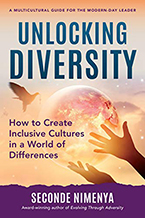July 7, 2020
Unlocking Diversity:
How to Create Inclusive Cultures in a World of Differences
Seconde Nimenya
Print ISBN: 978-1-7331124-8-2
Kindle Edition ISBN: 978-1-7331124-6-8
Nook Edition ISBN: 978-1-7331124-2-0
New Book Offers Solutions for Creating Diverse and Inclusive Cultures
 Seconde Nimenya’s new book Unlocking Diversity: How to Create Inclusive Cultures in a World of Differences is a book badly needed and long overdue, especially in the wake of the protests that have rocked the world following George Floyd’s death at the hands of police officers in Minneapolis, Minnesota, on May 25, 2020.
Seconde Nimenya’s new book Unlocking Diversity: How to Create Inclusive Cultures in a World of Differences is a book badly needed and long overdue, especially in the wake of the protests that have rocked the world following George Floyd’s death at the hands of police officers in Minneapolis, Minnesota, on May 25, 2020.
Racism remains a major problem in the United States and around the world. In this new book, Seconde Nimenya offers practical advice and fresh insights for how we can live in harmony with one another, learn to appreciate and celebrate our differences, and create a better world for all. As an immigrant first to Canada and then the United States from the East-African nation of Burundi, Seconde provides fresh perspectives about race and racism, and the benefits of creating inclusive workplaces and communities.
At the heart of this book is the need to listen to one another’s diverse stories and the need for all groups to take responsibility and work together to create a world in which we can all live together. Seconde does not point fingers but simply explains that everyone needs to be responsible for themselves and their efforts in developing an inclusive culture. We are all in this together, so we all need to be kind to each other as we sort out our social and racial issues to create a more diverse and inclusive environment where everyone can thrive.
Creating inclusive cultures primarily requires greater education about what inclusion means. I love that Seconde makes the point repeatedly in this book that more inclusion means more, not less. Just because we want to include more people from diverse backgrounds does not mean other people will be excluded—a fear too often held by people in more dominant cultures.
We also need to be willing to answer questions about our cultural backgrounds without being offended or hiding the truth. Seconde pokes fun at herself in the book for this reason because when she came to the United States, she got tired of people asking where she was from, so she started saying she was Canadian. Today, she is proud to say she came from Burundi to North America. In fact, her first book, Evolving Through Adversity, tells her incredible story of growing up in poverty amid Burundi’s civil wars and how, despite all the odds, she got an education. Today, she speaks to groups around the globe, sharing her message of how we can rise above adversity, while developing more diverse and inclusive societies.
Seconde asks us all to be open to sharing what we have learned from our experiences, and not be quick to dismiss people as ignorant if they ask questions because those questions reflect their willingness to learn.
Seconde also talks about the fine line people have to walk when trying to increase diversity. She states, “If you are promoting diversity acceptance for your group, but discounting other minority groups’ experiences, and even the so-called privileged, that is not inclusion work. Creating inclusive cultures is not about just advocating for your own people.” She invites diversity practitioners to advocate for everyone who is discriminated against because of who they are.
Throughout this book, Seconde offers advice for both individuals and organizations to increase diversity and inclusion in their lives, organizations, schools, and workplaces, and she focuses on how education is needed for such efforts to work. She states, “I believe education is the only solution that truly empowers communities and has the potential to end the cycle of violence and poverty.”
In the wake of the nationwide protests against racism in the US and even in many other parts of the world that took place in May and June 2020, Seconde’s message about systemic injustices is timely. It is not a government or a police department that is necessarily to blame for racism, but rather, Seconde states, “I often say systemic injustices didn’t put themselves into place; people did. And so, only people can take them down. Many countries have rebuilt from nothing and are a testimony that when we want to, we can. Each one of us is called to step up, use our privileges, and meet our local and global challenges with an inclusive consciousness.”
Seconde calls on those in leadership positions to remember that inclusion is not about taking away someone else’s privilege, but rather, inviting more of “them” to become part of “us.” She states, “there are no strangers in this life—only other people living their own human experiences.”
Obviously, our handling of race issues in America has a long way to go. It’s time for us to find new ways to work together.
Unlocking Diversity is a great book to help you start moving toward opening up conversations, increasing your understanding of one another, and doing your part in making the world better for all. That may be the greatest challenge and lesson we have been placed on this planet to learn. Until we learn it, our problems will never be solved.
For more information about Seconde Nimenya and Unlocking Diversity: How to Create Inclusive Cultures in a World of Differences, visit www.SecondeNimenya.com.
— Tyler R. Tichelaar, PhD and award-winning author of When Teddy Came to Town

